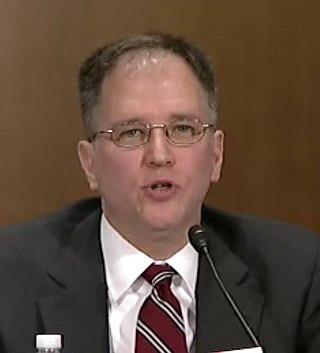Related Research Articles

In finance, default is failure to meet the legal obligations of a loan, for example when a home buyer fails to make a mortgage payment, or when a corporation or government fails to pay a bond which has reached maturity. A national or sovereign default is the failure or refusal of a government to repay its national debt.

Debt is an obligation that requires one party, the debtor, to pay money borrowed or otherwise withheld from another party, the creditor. Debt may be owed by sovereign state or country, local government, company, or an individual. Commercial debt is generally subject to contractual terms regarding the amount and timing of repayments of principal and interest. Loans, bonds, notes, and mortgages are all types of debt. In financial accounting, debt is a type of financial transaction, as distinct from equity.

Full-reserve banking is a system of banking where banks do not lend demand deposits and instead, only lend from time deposits. It differs from fractional-reserve banking, in which banks may lend funds on deposit, while fully reserved banks would be required to keep the full amount of each customer's demand deposits in cash, available for immediate withdrawal.

A student loan is a type of loan designed to help students pay for post-secondary education and the associated fees, such as tuition, books and supplies, and living expenses. It may differ from other types of loans in the fact that the interest rate may be substantially lower and the repayment schedule may be deferred while the student is still in school. It also differs in many countries in the strict laws regulating renegotiating and bankruptcy. This article highlights the differences of the student loan system in several major countries.

A payday loan is a short-term unsecured loan, often characterized by high interest rates.

In economics, consumer debt is the amount owed by consumers. It includes debts incurred on purchase of goods that are consumable and/or do not appreciate. In macroeconomic terms, it is debt which is used to fund consumption rather than investment.
A debtor or debitor is a legal entity that owes a debt to another entity. The entity may be an individual, a firm, a government, a company or other legal person. The counterparty is called a creditor. When the counterpart of this debt arrangement is a bank, the debtor is more often referred to as a borrower.

Second mortgages, commonly referred to as junior liens, are loans secured by a property in addition to the primary mortgage. Depending on the time at which the second mortgage is originated, the loan can be structured as either a standalone second mortgage or piggyback second mortgage. Whilst a standalone second mortgage is opened subsequent to the primary loan, those with a piggyback loan structure are originated simultaneously with the primary mortgage. With regard to the method in which funds are withdrawn, second mortgages can be arranged as home equity loans or home equity lines of credit. Home equity loans are granted for the full amount at the time of loan origination in contrast to home equity lines of credit which permit the homeowner access to a predetermined amount which is repaid during the repayment period.
The Austrian business cycle theory (ABCT) is an economic theory developed by the Austrian School of economics about how business cycles occur. The theory views business cycles as the consequence of excessive growth in bank credit due to artificially low interest rates set by a central bank or fractional reserve banks. The Austrian business cycle theory originated in the work of Austrian School economists Ludwig von Mises and Friedrich Hayek. Hayek won the Nobel Prize in Economics in 1974 in part for his work on this theory.
A hard money loan is a specific type of asset-based loan: a financing instrument through which a borrower receives funds secured by real property. Hard money loans are typically issued by private investors or companies. Interest rates are typically higher than conventional commercial or residential property loans because of the higher risk and shorter duration of the loan.

Todd Joseph Zywicki is an American lawyer, legal scholar and educator. He is a George Mason University Foundation Professor of Law at George Mason University School of Law, teaching in the areas of bankruptcy and contracts.

College tuition in the United States is the cost of higher education collected by educational institutions in the United States, and paid by individuals. It does not include the tuition covered through general taxes or from other government funds, or that is paid from university endowment funds or gifts. Tuition for college has increased as the value, quality, and quantity of education have increased. Many feel that increases in cost have not been accompanied by increases in quality, and that administrative costs are excessive. The value of a college education has become a topic of national debate in the U.S.
In economics, implicit contracts refer to voluntary and self-enforcing long term agreements made between two parties regarding the future exchange of goods or services. Implicit contracts theory was first developed to explain why there are quantity adjustments (layoffs) instead of price adjustments in the labor market during recessions.

A payday loan is a small, short-term unsecured loan, "regardless of whether repayment of loans is linked to a borrower's payday." The loans are also sometimes referred to as "cash advances," though that term can also refer to cash provided against a prearranged line of credit such as a credit card. Payday advance loans rely on the consumer having previous payroll and employment records. Legislation regarding payday loans varies widely between different countries and, within the United States, between different states.

Payday loans in the United Kingdom are typically small value and for short periods. Payday loans are often used as a term by members of the public generically to refer to all forms of High-cost Short-term credit (HCSTC) including instalment loans, e.g. 3-9 month products, rather than just loans provided until the next pay day.

The 2007–2008 financial crisis, or Global Financial Crisis (GFC), was the most severe worldwide economic crisis since the Great Depression of 1929. Predatory lending targeting low-income homebuyers, excessive risk-taking by global financial institutions, and the bursting of the United States housing bubble culminated in a "perfect storm".
A borrowing limit is the amount of money that individuals could borrow from other individuals, firms, banks or governments. There are many types of borrowing limits, and a natural borrowing limit is one specific type of borrowing limit among those. When individuals are said to face the natural borrowing limit, it implies they are allowed to borrow up to the sum of all their future incomes. A natural debt limit and a natural borrowing constraint are other ways to refer to the natural borrowing limit.
Nathalie Martin is the Frederick M. Hart Chair in Consumer and Clinical Law at the University of New Mexico School of Law. She is a member of the American Law Institute and the American College of Bankruptcy as well as a former resident scholar at the American Bankruptcy Institute and a former dean of faculty of the American Board of Certification, which writes the tests used to certify bankruptcy attorneys. She is also a regular contributor to Credit Slips, a blog on debtor creditor issues.
Marianne Bertrand is a Belgian economist who currently works as Chris P. Dialynas Professor of Economics at the University of Chicago's Booth School of Business. Bertrand belongs to the world's most prominent labour economists in terms of research, which has been awarded the 2004 Elaine Bennett Research Prize and the 2012 Sherwin Rosen Prize for Outstanding Contributions in the Field of Labor Economics. She is a research fellow of the National Bureau of Economic Research, and the IZA Institute of Labor Economics.
Michèle Tertilt is a German professor of economics at the University of Mannheim. Before, Tertilt was an assistant professor at Stanford University. She also spent a year at the University of Pennsylvania and one year as a research fellow at the Hoover Institution. She is currently a director of the Review of Economic Studies and associate editor of the Journal of Development Economics. In 2017 she received the Yrjö Jahnsson Award – a biennial award by the European Economic Association and the Yrjö Jahnsson Foundation to a European economist no older than 45 years, who has made a contribution in theoretical and applied research that is significant to economics in Europe. In September 2013 she was awarded the Gossen Prize – an annual award by the Verein für Socialpolitik which recognizes the best published economist under 45 working in the German-speaking area. Tertilt is the first woman to win this prestigious German prize in economics. In 2019, she was awarded the Gottfried Wilhelm Leibniz Prize by the Deutsche Forschungsgemeinschaft. Her main focus is around development and intra-family interactions. She has also worked on consumer credit and bankruptcies.
References
- ↑ "Paige Skiba Faculty Law School Vanderbilt University". law.vanderbilt.edu. Retrieved 2023-03-09.
- ↑ "Paige Marta Skiba". www.journals.elsevier.com. Retrieved 2020-08-18.
- ↑ "Paige Marta Skiba". The Conversation. Retrieved 2020-08-18.
- ↑ White, Gillian B. (2015-11-05). "Borrowing While Poor". The Atlantic. Retrieved 2020-08-18.
- ↑ Zywicki, Todd. "NYT on auto title pawns". Washington Post. Retrieved 2020-08-18.
- ↑ "What do struggling small businesses need most? Time – and bankruptcy can provide it". TheStreet.com. Retrieved 2020-08-18.